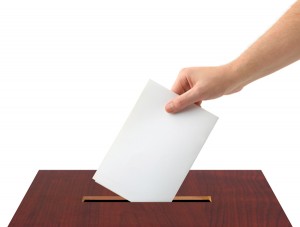 Think your one vote doesn’t matter? Virginians may have thought so, too, until this week.
Think your one vote doesn’t matter? Virginians may have thought so, too, until this week.
There, an election for the House of Delegates, that state’s House of Representatives, is stuck in a tie. Republican Delegate David Yancey initially won the race to represent Newport News by 10 votes. After a recount, Democrat Shelly Simonds won by one vote. But then a disputed ballot was successfully challenged, leaving the count at 11,608-11,608. The winner’s name likely will be picked randomly from a glass bowl.
It’s about more than one legislative seat
OK, we’re talking about a single state legislative race. Big deal, right?
Well, yeah it is, because the direction of Virginia politics depends on the outcome. If the Republican wins, the party maintains a 51-49 majority, which is still enough to elect a speaker and set the agenda. If the Democrat wins, it’s 50-50, meaning the two parties will share power in that chamber. Meanwhile, Republicans still control the Virginia Senate with a 21-19 majority. The newly elected governor, and the current one, are Democrats.
Whatever happens will affect average Virginians – regarding their taxes, government health spending, education, and other issues. If those average Virginians live in Newport News and didn’t vote, they’ll have a lot less grounds to complain.
Not the first really close election
Single-vote elections are rare, and they usually don’t have this much of an effect. But we’ve had plenty of close ones – most notably, the statistical tie in Florida during the 2000 presidential election. President George W. Bush defeated Al Gore there by 537 votes, meaning a shift of 269 votes would have given the state and the election to Gore.
How would that have changed things? Would the Sept. 11 attacks still have happened, or at a different time and in a different way? Would Gore have responded by invading Afghanistan (possibly) and Iraq (probably not)? How would Gore’s Supreme Court justice nominees have differed from Bush’s two? Would Gore have cut taxes as Bush did, or raise them, as President Clinton did, and would the national debt have doubled under his watch, as it did under Bush’s?
The answers to all of those questions were determined by the votes of 269 Floridians who picked Bush instead of Gove, and by 538 who preferred Gore but didn’t vote at all.
More recently, the 2016 presidential election was decided in Michigan, Pennsylvania and Wisconsin by less than 80,000 combined votes. That’s the difference between having President Trump and President Hillary Clinton.
Think that would have mattered?
Turnout in Arkansas
Elections often are decided by small margins determined mostly by turnout. In Arkansas, 1,678,828 voters were registered in 2016, and 1,137,772 people voted in the general election. In other words, more than 541,000 people had believed it was important to register but then didn’t vote. Last year’s presidential election attracted almost 300,000 more voters than the 2014 midterms, and now we’re heading into another midterm election. About 500,000 more Arkansans voted in the general election last year than in the party primaries, which for many races are more important.
In other words, many Arkansans think voting is important, but, for various reasons, they only do it some of the time. In Virginia, that dynamic produced a tie vote in a special election, and may have produced a gridlocked legislature.
One great thing about our democracy is that you can vote your conscience, or not at all. I get it if you want to stay out of the whole political mess and simply live your life. Just keep paying your taxes, if I have to. And let’s not overdo this. It’s unlikely you or I will ever participate in an election decided by one vote.
But, as we’re seeing in Newport News, each one vote, or decision not to vote, multiplied thousands or millions of times can change everything. Now, a state’s political future depends on a random drawing from a glass bowl. So, yes, Virginia, one vote really does matter. Same for Arkansas.
By Steve Brawner
© 2017 by Steve Brawner Communications, Inc.